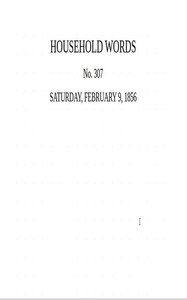Household words, no. 307, February 9, 1856 : A weekly journal by Charles Dickens
"Household Words, no. 307, February 9, 1856: A Weekly Journal by Charles Dickens" is an issue of a weekly magazine published in 1856. This tuppence publication brought fiction, social commentary, and serialized novels to middle-class Victorian readers every Saturday. Under Dickens's editorship, the journal featured unsigned articles, collaborative Christmas stories, and works by prominent writers including Elizabeth Gaskell and Wilkie Collins. This particular issue represents one installment of a magazine that championed
social reform while entertaining thousands of households across England with its blend of literature and cultural observation. (This is an automatically generated summary.)
Read or download for free
| How to read | Url | Size | |||
|---|---|---|---|---|---|
| Read now! | https://www.gutenberg.org/ebooks/76386.html.images | 168 kB | |||
| EPUB3 (E-readers incl. Send-to-Kindle) | https://www.gutenberg.org/ebooks/76386.epub3.images | 185 kB | |||
| EPUB (older E-readers) | https://www.gutenberg.org/ebooks/76386.epub.images | 183 kB | |||
| EPUB (no images, older E-readers) | https://www.gutenberg.org/ebooks/76386.epub.noimages | 150 kB | |||
| Kindle | https://www.gutenberg.org/ebooks/76386.kf8.images | 199 kB | |||
| older Kindles | https://www.gutenberg.org/ebooks/76386.kindle.images | 185 kB | |||
| Plain Text UTF-8 | https://www.gutenberg.org/ebooks/76386.txt.utf-8 | 153 kB | |||
| Download HTML (zip) | https://www.gutenberg.org/cache/epub/76386/pg76386-h.zip | 136 kB | |||
| There may be more files related to this item. | |||||
Similar Books
About this eBook
| Editor | Dickens, Charles, 1812-1870 |
|---|---|
| Title | Household words, no. 307, February 9, 1856 : A weekly journal |
| Original Publication | London: Office, 1856. |
| Note | en.wikipedia.org/wiki/Household_Words |
| Credits | Ed Foster and the Online Distributed Proofreading Team at www.pgdp.net (This file was produced from images generously made available by The Internet Archive) |
| Reading Level | Reading ease score: 63.6 (8th & 9th grade). Neither easy nor difficult to read. |
| Language | English |
| LoC Class | AP: General Works: Periodicals |
| Subject | English literature -- Periodicals |
| Category | Text |
| EBook-No. | 76386 |
| Release Date | Jun 26, 2025 |
| Copyright Status | Public domain in the USA. |
| Downloads | 281 downloads in the last 30 days. |
| Project Gutenberg eBooks are always free! | |

